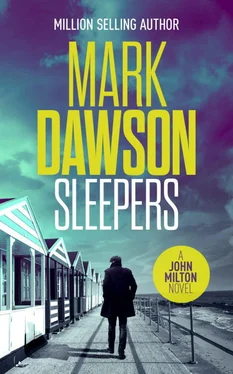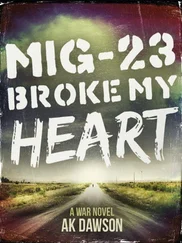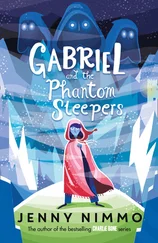The bartender returned with the bill hidden in a small leather folder. Milton opened it, saw that it was for thirty pounds, took out his wallet and slid three ten-pound notes into the folder.
He felt someone next to him. Milton looked up and saw that a woman was standing there, smiling at him. “Is this stool taken?”
“No,” Milton said. “Help yourself.”
She sat down. “Getting the train?”
“Yes,” he said.
“Me too. Shopping in Paris. Haven’t been for years.”
Milton nodded and smiled.
“What about you?” she asked.
“Cycling holiday,” he said, slipping into his legend.
“Really? Where?”
“Around Lake Annecy.”
“Beautiful,” she said. “I’ve driven through there before. Stunning scenery.” She put out her hand. “Laura Wood,” she said.
“John Smith.”
She ordered a glass of champagne and talked at Milton while she drank it, a stream of pointless anecdotes about France, her life in Kensington and her job in Soho as an agent for film and television actors. She was monumentally self-absorbed and spoke relentlessly; all Milton had to do was make the occasional affirmative noise and she would continue on with another inane story. She finished her glass and, with a final air kiss that missed Milton’s left cheek by a clear two inches, she went to do a little shopping before the train departed.
Milton watched her go. The scent she was wearing had reminded him of Jessie Ross. Tanner had barely mentioned her during the briefing. She had been swallowed up by SIS, and would, he guessed, be interrogated for every last scrap of information about her recruitment by the SVR and about how she had worked for them for so long. They would want to know how much damage she had caused. Aleksandrov was just the most recent betrayal. They would want to know who else she had fingered for Timoshev and Kuznetzov’s malign attention. Milton had no idea what her future would hold. She would have to persuade her superiors that she could be trusted to work against the Russians, and that was assuming that she was able to persuade the replacement for the slain Primakov that she was still a viable source. Even if she was able to prove that she was worth the risk, she would still be kept on the shortest possible leash. The fates of her son and her parents would forever be held over her as she started to record entries on the opposite page of the ledger and begin the work to remedy the damage that her betrayal had caused.
Milton drained the flute, looked at his watch and changed his mind. He signalled the bartender.
“Sir?”
“I’ll have the bottle, please.”
The bartender was discreet, as if it were commonplace for a single traveller to order a two-hundred-pound bottle of champagne for himself. Milton didn’t know; perhaps it was. The man returned with an ice bucket and the champagne, and took the bill away so that he could update it. Milton finished the glass and poured himself another. He had a long trip ahead of him, and then he had to prepare for his assignment.
He turned and Callaghan was sitting on the stool. You think this is it? You think you can get out? They’ll just let you leave? Come on, Milton. Doesn’t work like that. You know it doesn’t. They’ll never let you go. You’re in this for life. You belong to them. You’re theirs.
Milton emptied the glass in one draught and poured again. The phantom disappeared, but Milton could still hear his voice, whispering in the spaces between his thoughts. The whispers were right, but Milton didn’t care. He was done. Finished. He would honour this file but no more.
He was going to get out.
It’s a standard question when I tell people that I make my living as an author: where do you get your ideas? I’ve never had a problem with finding something interesting for my characters to do. It’s often just a case of opening the newspaper or going to the cinema. The genesis of this book has been a little different, though. More immediate. Closer to home, and, once I started investigating and writing, much more difficult to stop.
I live and work in Salisbury. I had made good progress with my new novel when Sergei and Yulia Skripal were found on a bench in the Maltings, a shopping precinct in the centre of town. It’s a two minute walk from my office to that bench, and, as the story changed from a suspected drug overdose to an attempted assassination that then became an international story, it was something that I simply couldn’t ignore. More recent developments, in which Dawn Sturgess and Charlie Rowley were also poisoned (with Sturgess tragically passing away) have added another, more frightening, dimension.
Life has imitated art. I was writing about a defecting spy who comes to the attention of his previous employer, and local events added relevance that would have been hard to credit if they were not true. My research has unfolded around me. I’ve watched the media helicopters hovering over the spire of the beautiful cathedral. I’ve seen forensics tents erected around suspected crime scenes. I’ve observed soldiers in Hazmat suits shutting down a homeless shelter. I’ve spoken to the police officers who have been guarding the cordons. I know the restaurant and pub that the Skripals visited before they became unwell. My daughter was playing in the park that was closed after the two subsequent victims were poisoned. And I live close to the hospital where all the victims were treated. As the story developed, so too did my compulsion to write about it.
If you ask around on the streets you will find plenty of people who don’t believe the official narrative. That’s not surprising. The authorities have revealed very little, for good reason. An official narrative that is so full of holes offers licence for conspiracy theories, and you’ll find no shortage of them if you ask around. It also makes it possible for an author to take the lines of a story that has been sketched out and then to colour in the blanks. Why was Skripal targeted? Who targeted him? Why was an exotic nerve agent used, rather than a more prosaic – but more effective – method? How did Sturgess and Rowley find the poison? Why – if reports are true – did the would be assassins ditch the bottle rather than dispose of it more carefully?
It’s been a challenge to take these starting points and turn them into a work of fiction while also remembering that this is an on-going story, with a human cost to those who have been unfortunate enough to have been affected by it. It has also been an interesting and exciting project, and one that I hope you’ve enjoyed.
Mark Dawson Salisbury, September 2018
Building a relationship with my readers is the very best thing about writing. I occasionally send newsletters with details on new releases, special offers and other bits of news relating to the Milton, Beatrix and Isabella Rose and Soho Noir series.
If you join my Readers’ Club I’ll send you this free Milton content:
1. A free copy of Milton’s adventure in North Korea – ‘1000 Yards.’
2. A free copy of Milton’s tussle with a Mafia assassin in ‘Tarantula.’
3. An eyes-only profile of Milton from a Group Fifteen psychologist.
You can get your free content by visiting my website at markjdawson.com. I’ll look forward to seeing you there.
In the John Milton Series
The Cleaner
Sharon Warriner is a single mother in the East End of London, fearful that she’s lost her young son to a life in the gangs. After John Milton saves her life, he promises to help. But the gang, and the charismatic rapper who leads it, is not about to cooperate with him.
Читать дальше












